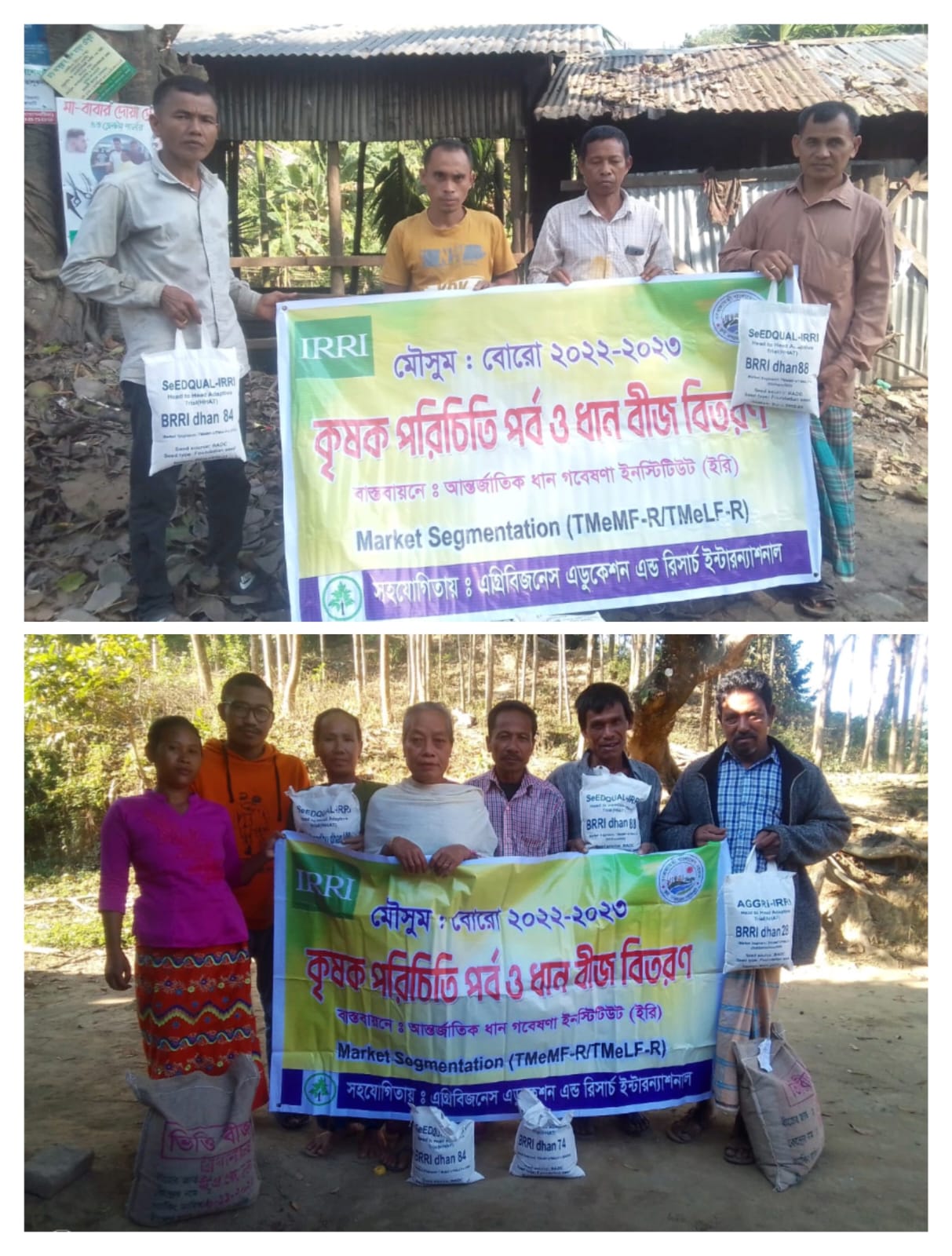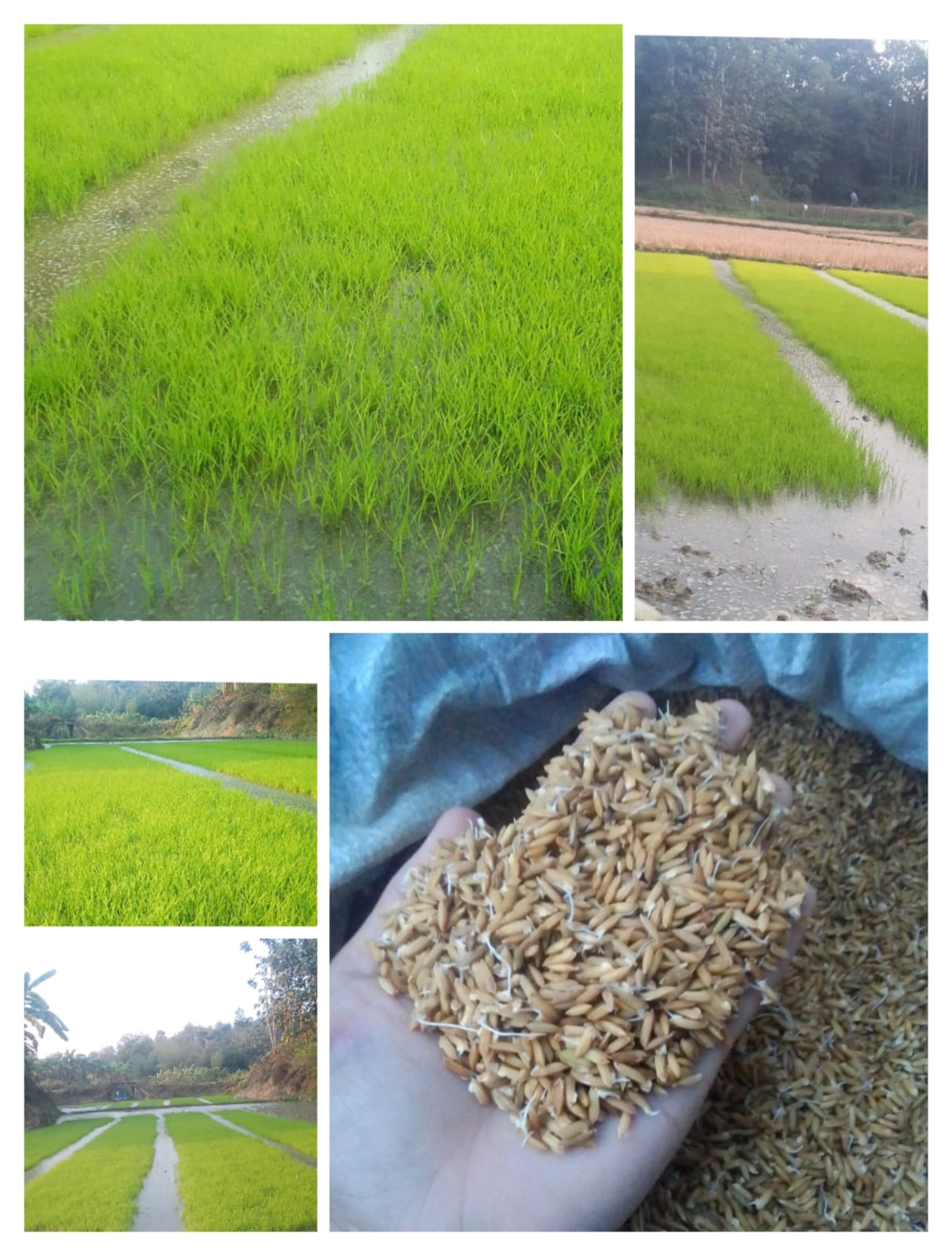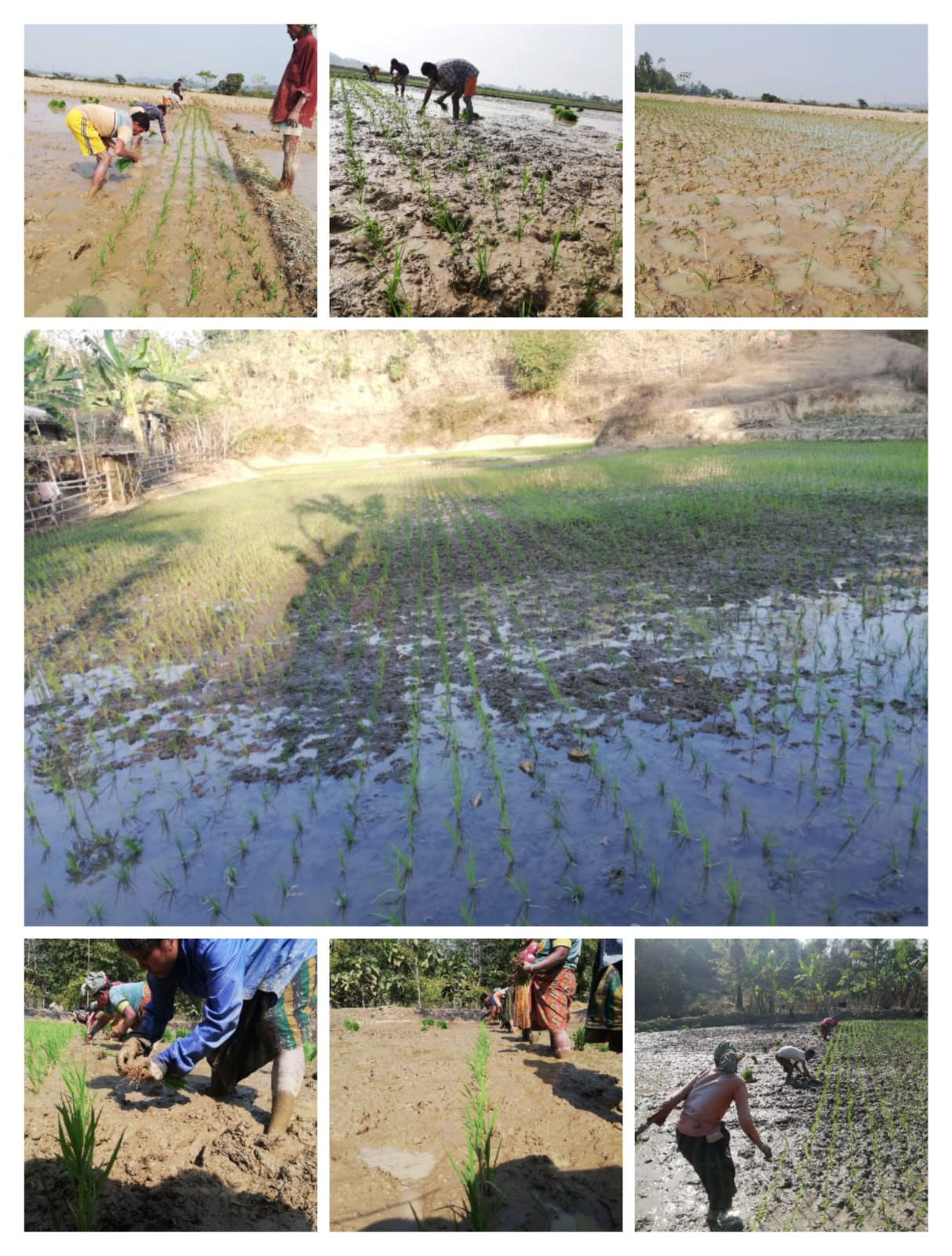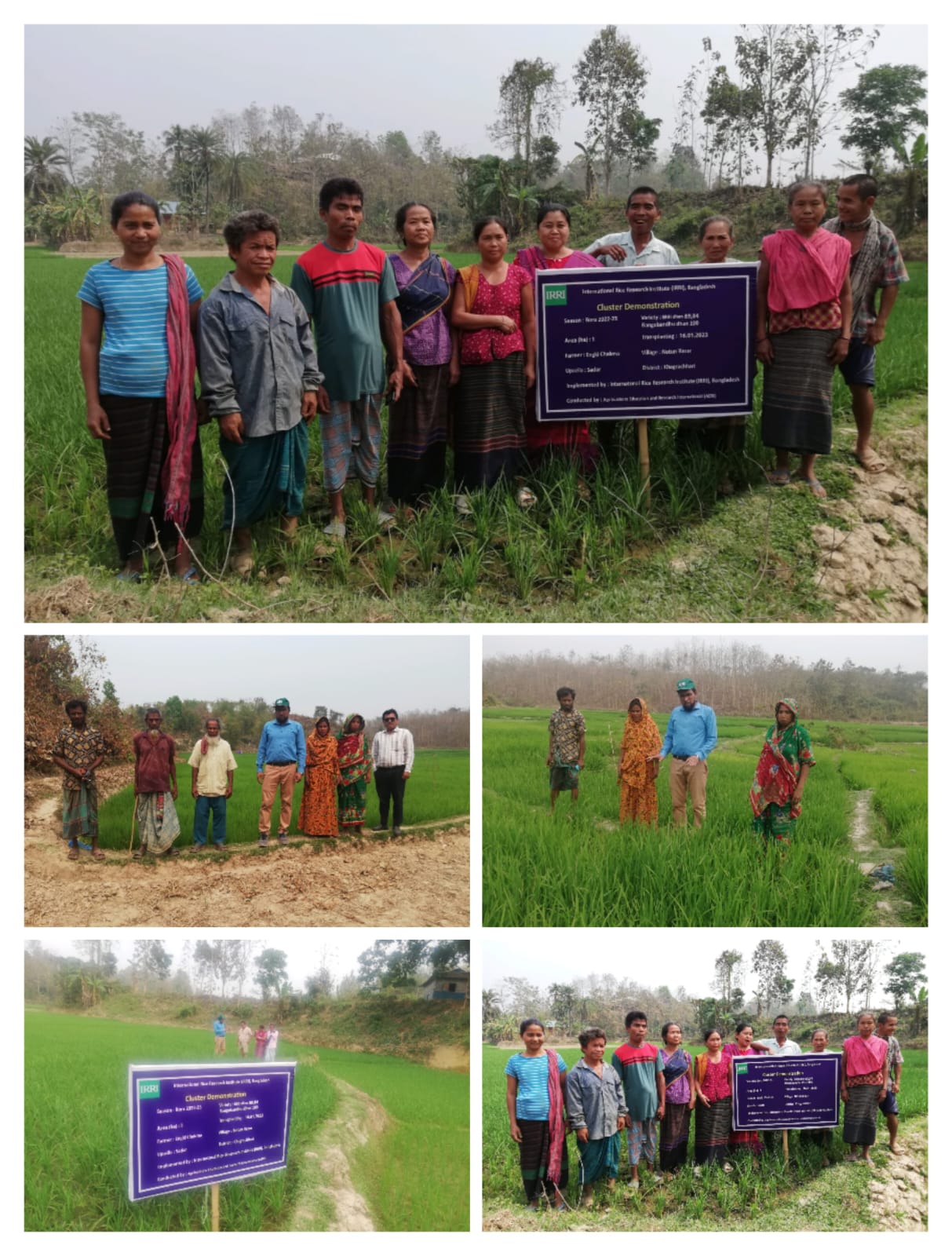Implementation of the trial titled “Head to Head Adaptive Trial (HHAT) of Modern Rice Varieties (IRRI–BRRI Protocol)” under Bangabandhu Sheikh Mujibur Rahman Science and Technology University in Boro 2022-2023 season in Bangladesh by Agribusiness Education and Research International (AERI)
Crop genetic advancement can make a big contribution to the current global food security dilemma. By the year 2050, it is predicted that the global food supply will need to expand by 70% to keep up with rising demand. The production of rice, one of the three main basic foods in the world, must increase in order to meet this objective, especially in Asia where there is little room for horizontal development. With Green Revolution methods aimed at the better-endowed areas under irrigation, significant production increases were made in the 1970s. Scientists have since been confronted with two problems.
First off, there are few chances for a considerable improvement in maximum yields, which have remained relatively constant around 11.0 t ha-1 in the better endowed locations. In these places, technological advancements have primarily focused on maintenance research in addition to making up for declining soil fertility and limited water supply. Second, the Green Revolution has eluded rainfed regions, especially those troubled by flash floods and drought. To increase productivity in rainfed regions vulnerable to these environmental pressures, significant efforts have been made by rice scientists around the world.
Bangabandhu Sheikh Mujibur Rahman Science and Technology University((BSMRSTU) collaborates with the International Rice Research Institute (IRRI) under AGGRi program to conduct HHAT. The objectives of the project are- collecting robust data information and verifying the suitability of modern high yielding promising varieties of rice in the different parts of the country; comparing popular varieties with candidate products; selecting suitable varieties for specific regions; rapid expansion of candidate product at field level and collecting the farmers feedback on cultivable varieties and taking necessary steps. Dr. Zilhas Ahmed Jewel, Assistant Professor, Department of Agriculture, Bangabandhu Sheikh Mujibur Rahman Science and Technology University managing hilly areas 20 (Twenty) trials and 02 (Two) associating with AERI.
The AGRRiseed system Team in Bangladesh are providing all kind of technical support for conducting the trials, coordination, field supervision, and need-based field assistance. As well as supporting and helping the partner for conducting the trials as per IRRI–BRRI protocol guidelines for avoiding any kind of biasness.
Bangladesh and IRRI have been working together for more than five decades. Bangladesh was the site of IRRI’s first overseas outreach operation. The Savar Farm, a government-run dairy venture outside Dhaka, examined 303 rice cultivars in 1965. The first widely circulated high-yielding semidwarf rice variety, IR8, was introduced into the country two years later, in 1967.
According to the International Rice Research Institute, the country’s rice production has climbed 3.6 times in the last five decades, from 15 million tonnes in 1971 to 54 million tonnes in 2019, making it the fourth biggest in the world (IRRI).
Bangladesh has attained cereal self-sufficiency because of significant government investments in research, farming technologies, and incentives.
Bangladesh is a significant agricultural country, and the country’s economy is still heavily reliant on it; agriculture employs 70% of the people directly or indirectly.
Rice is a basic food for more than half of the world’s population, including Bangladesh’s 135 million inhabitants. Rice accounts for over half of all rural jobs, two-thirds of total calorie supply, and one-half of total protein consumption for the average person in the country. Rice is grown by about 13 million families across the country on around 10.5 million hectares. Rice is cultivated on around 75% of the total farmed area and over 80% of the total irrigated area. Bangladesh Rice Research Institute (BRRI) was founded in 1970 with the goal of developing contemporary rice varieties that are better adapted to local growing conditions and enhanced production procedures that have won it a high reputation in Bangladesh and throughout the world.
The trial will give more confidence to farmers for choosing the best product for their region or community through these different varietal characteristics exhibition with their own agronomic management practice. Below are varietal characteristics and agronomic management which will give more confidence to the farmer and their neighbor:
Varietal characteristics:
Growing season, Growth duration, Ecosystem, Tolerance, Plant height, leaf arrangement, yield potential, grain size, shape, and color.
Agronomic Management:
Seed and seedbed preparation, seedling uprooting, use of optimum aged seedling, Land preparation, Balanced fertilization, Optimum irrigation, Weed management, Insect and disease management, Timely harvesting, etc.
Head to Head Adaptive Trial (HHAT) of the following Modern Rice Varieties implemented by Agribusiness Education and Research International:-
- Bangabandhu dhan 100
- BRRI dhan 74
- BRRI dhan 88
- BRRI dhan 28
- BRRI dhan 84
Seed distribution
Seed distribution of the trial titled “Head to Head Adaptive Trial (HHAT) of Modern Rice Varieties(IRRI-BRRI Protocol)” under Bangabandhu Sheikh Mujibur Rahman Science and Technology University in Boro 2022-2023 season in Bangladesh by Agribusiness Education and Research International

Seedling uprooting & Seedbed preparation:

Use of optimum aged seedling
This trial will be implemented in two districts in Bangladesh. Already Seeds are given to farmers at the early of Boro 2022 season. Now, Farmers are started transplanting rice. By The way, Agribusiness Education and Agribusiness Education and Research International will successfully implement the trial as per the guidelines. This firm has been working with the International Rice Research Institute (IRRI) since 2021. Agribusiness Education and Research International also successfully implemented the trial titled “Head to Head Trial (HHAT) of Modern Rice Varieties” under the TRB project of Bangladesh Rice Research Institute (BRRI) in Boro 2022-2023, Aman 2022, Boro 2020-2021 season, Aman 2021 season in Bangladesh.

Cluster Demonstration:
AERI implemented two (02) cluster demonstration in Boro 2022-2023.
The quality of the population and the accurate application of pesticides and fertilizers are influenced by the uniformity of the distribution of rice clusters in the field. The use of clustered farms in large-scale demonstrations has lately gained popularity as an extension strategy, and it has its own strong justification and valuable insights from earlier extension initiatives.
Comparing the Large Scale Demonstration approach to Small Scale Demonstration on scattered plots, some key benefits include: cost effectiveness in terms of labor, time, energy, and money; the creation of a learning platform and a strong sense of competition among farmers; ease of management and provision of mechanization services; ease of evaluation; the ability to address large clients or technology beneficiaries at a given time; and the strengthening of social capital in terms of contact and communication between farmers.

Agribusiness Education and Research International are committed to providing comprehensive syndicated research to farm industry leaders, evaluating market dynamics in agribusiness, agriculture, crop protection, seeds, and more. The broad experience of our team in the agriculture industry combined with marketing research expertise forms the basis for reports which provide clear insights and realistic tactics.
Agribusiness Education and Research International are one of the best international educational websites in the world in the Agribusiness sector.
Agribusiness Education and Research International are one of the firms duly registered in the office of the Registrar of Joint Stock Companies and Firms (RJSC) under the Partnership Act, 1932.
Agribusiness Education and Research International is also a seed dealer duly registered in the office seed wing of the Ministry of Agriculture.
Agribusiness and marketing related to national and international research are highly performed by a group of renowned research personnel.
Contact us:
If you have any questions, thoughts, or suggestions, please contact us or join our social media networks.
Email us: [email protected], [email protected]
Feel free to comment:
Your email address will not be shared with anyone.
Join our LinkedIn group
https://www.linkedin.com/groups/13943442/
Join our Facebook group
https://www.facebook.com/groups/agribusinesseducationandresearchinternational
You may read:
Agribusiness operational decision-making tools – Agribusiness Education and Research International
The Dollar Crisis and Agro Enterprise Management – Agribusiness Education and Research International
https://agribusinessedu.com/why-is-market-information-important/
Agribusiness value chain in Southeast Asia – Agribusiness Education and Research International
You May Read: What are the Characteristics and Traits of an Entrepreneur? – Agribusiness Education and Research International
You may read: Agribusiness how it works? – Agribusiness Education and Research International
You may read: Covid -19 Pandemic Impact on Agribusiness – Agribusiness Education and Research International
You may read: What is Agribusiness? – Agribusiness Education and Research International
You may read: Agribusiness in Bangladesh – A Basic Introduction – Agribusiness Education and Research International
You may read: Organic Agriculture Introduction – Agribusiness Education and Research International
You may read: What is Sustainable Agriculture? – Agribusiness Education and Research International
What is Permaculture? – Agribusiness Education and Research International
E-Commerce and Supply Chain Finance – Agribusiness Education and Research International
What is Supply Chain Finance? – Agribusiness Education and Research International
What is an agile supply chain in Agribusiness? – Agribusiness Education and Research International
What is Supply Chain Management in Agribusiness? – Agribusiness Education and Research International
Supply chain management and Agribusiness – Agribusiness Education and Research International
Factors Affecting Supply Elasticity – Agribusiness Education and Research International






Leave a Reply